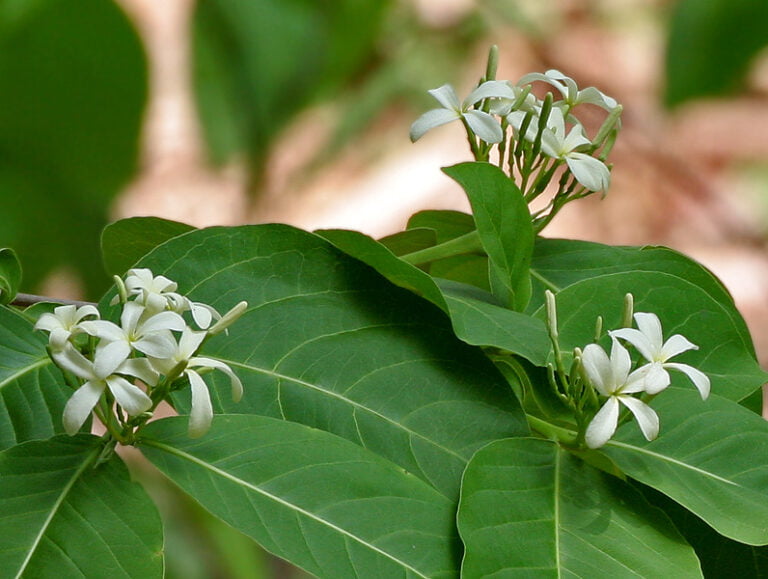Kutaja (Holarrhena antidysenterica) Benefits, Uses and Properties

Holarrhena antidysenterica, also known as Indrajao or Kutaja, is a medicinal plant with a variety of health benefits. Here are some of its notable uses:
- Digestive Health: It is well-known for treating chronic diarrhoea and dysentery. It helps reduce mucus content in stool and checks bleeding.
- Anti-Diabetic: The herb has shown beneficial effects for diabetes by lowering blood glucose levels and improving overall metabolic health.
- Anti-Microbial: Holarrhena antidysenterica has anti-fungal, anti-microbial, and anti-bacterial properties, making it effective against various infections.
- Anti-Inflammatory: It helps reduce inflammation and is used to treat conditions like arthritis and other inflammatory disorders.
- Immune Support: The herb boosts the immune system and supports the body’s natural healing processes.
- Skin Health: It is used to treat skin conditions such as eczema and psoriasis due to its anti-inflammatory and anti-microbial properties.
- Gastrointestinal Issues: It is beneficial for treating gastrointestinal problems, including chronic constipation and bleeding piles
The Chemical Properties of Kutaja (Holarrhena antidysenterica)
Here are some of the key chemical constituents:
- Steroidal Alkaloids: These include conessine, conimine, and conessidine, which are primarily responsible for the plant’s anti-diarrheal and anti-plasmodial activities.
- Flavonoids: These compounds have antioxidant properties and contribute to the plant’s overall health benefits.
- Triterpenoids: Known for their anti-inflammatory and anti-cancer properties.
- Phenolic Acids: These have antioxidant and anti-inflammatory effects.
- Tannins: These compounds have astringent properties and help in treating diarrhoea and dysentery.
- Resins: These contribute to the plant’s therapeutic effects.
- Coumarins: Known for their anti-coagulant and anti-inflammatory properties.
- Saponins: These have immune-boosting and anti-inflammatory effects.
- Ergosterol: A precursor to vitamin D2 and has various health benefits.
These chemical properties make Kutaja a potent medicinal herb with a wide range of therapeutic applications.
How to use Kutaja (Holarrhena antidysenterica) as herbal medicines
Holarrhena antidysenterica (Kutaja) can be used in various forms for its medicinal benefits. Here are some common methods of preparation and usage:
- Decoction:
- Preparation: Boil the bark or seeds in water until the volume is reduced by half.
- Usage: This decoction can be taken to treat diarrhoea, dysentery, and other gastrointestinal issues. Typically, 10-20 ml is taken twice a day.
- Powder:
- Preparation: The dried bark or seeds are ground into a fine powder.
- Usage: The powder can be mixed with water or honey and taken to manage diabetes, improve digestion, and boost immunity. The usual dose is 3-6 grams per day.
- Paste:
- Preparation: The bark or seeds are ground with a little water to form a paste.
- Usage: This paste can be applied topically to treat skin conditions like eczema and psoriasis.
- Infusion:
- Preparation: Soak the bark or seeds in hot water for several hours.
- Usage: The infusion can be consumed to help with digestive issues and to boost overall health.
- Tablets/Capsules:
- Preparation: Available in the market as standardized extracts in tablet or capsule form.
- Usage: Follow the dosage instructions provided on the packaging or as advised by a healthcare professional.
While Holarrhena antidysenterica (Kutaja) offers numerous health benefits, it’s important to be aware of its potential side effects and safety precautions:
Potential Side Effects:
- Gastrointestinal Issues: In some cases, Kutaja may cause nausea, vomiting, or stomach discomfort, especially if taken in large doses.
- Allergic Reactions: Some individuals may experience allergic reactions such as skin rashes, itching, or swelling.
- Hypoglycemia: Since Kutaja can lower blood sugar levels, it may cause hypoglycemia (low blood sugar) in people taking anti-diabetic medications.
- Dizziness and Headache: These symptoms may occur, particularly if the herb is taken in excess.
Safety Precautions:
- Consultation: Always consult with a healthcare provider before starting any herbal treatment, especially if you are pregnant, nursing, or have any pre-existing health conditions.
- Dosage: Stick to recommended dosages to avoid potential side effects. Overuse can lead to adverse effects.
- Monitoring: If you are using Kutaja for diabetes, regularly monitor your blood sugar levels to avoid hypoglycemia.
- Allergies: Be aware of any allergic reactions and discontinue use if any adverse effects occur.
- Children and Elderly: Use with caution in children and the elderly, as they may be more sensitive to its effects.
General Advice:
- Start Small: Begin with a lower dose to see how your body reacts before gradually increasing to the recommended dosage.
- Quality: Ensure you are using high-quality, properly identified Kutaja to avoid contamination or adulteration.

